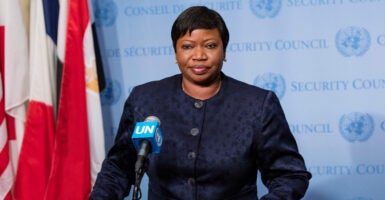Almost 250 years ago, America’s Founding Fathers drafted the Declaration of Independence, cataloging the ways that King George III had infringed upon American liberties.
King George’s offenses included “Transporting us beyond the Seas to be tried for pretended Offences.”
Back then, the king presumed to have the authority to seize American colonists and prosecute them in Great Britain. America went to war to end that practice and other injustices.
Fast-forward to about 20 years ago, when Congress passed the American Service-members’ Protection Act of 2002 in anticipation of the Rome Statute of the International Criminal Court entering into force.
Congress was concerned that U.S. armed forces deployed across the globe could be dragged in front of the International Criminal Court for fighting America’s wars. Congress was right to be concerned.
The court’s prosecutor, Fatou Bensouda of Gambia, is currently investigating U.S. officials from the Bush administration for alleged abuse of detainees in Afghanistan. These U.S. officials—most likely senior officials from the Defense Department, CIA, Justice Department, and the White House—may be summoned to appear before the court or issued warrants at any time.
Who exactly is Bensouda investigating? Well, that’s a secret.
Bensouda has a document called “Annex 3C” tucked away somewhere in the bowels of the International Criminal Court listing the names of the Americans that she’s targeting. We don’t know who those Americans are, but Bensouda has categorized them as the U.S. officials “who developed, authorized or bore oversight responsibility” for detainee interrogation in Afghanistan.
Bensouda might be reluctant to publicly “name names,” but other organizations are not similarly constrained. In 2015, Human Rights Watch put the finger on Americans “who played a role in the process of creating, authorizing, and implementing the CIA [interrogation] program.”
The Human Rights Watch hit list is a “who’s who” of boogeymen from the George W. Bush administration; among them, Attorney General John Ashcroft and CIA Director George Tenet; White House officials Alberto Gonzales and David Addington; and Justice Department officials Jay Bybee and John Yoo. Even Bush himself and Vice President Dick Cheney make the cut.
The U.S. has long maintained that the International Criminal Court doesn’t have jurisdiction over these former officials, since the United States is not a party to the Rome Statute.
Bensouda thinks otherwise. She maintains that since Afghanistan is party to the Rome Statute that she can put these Americans in the court’s dock.
What can the Biden administration do to protect these American citizens from the International Criminal Court? That’s where American Service-members’ Protection Act comes in.
That act authorizes the president to “use all means necessary” to set free any American who is detained or imprisoned by the International Criminal Court.
For that reason, the American Service-members’ Protection Act has been derided by its critics and hailed by its supporters as the “Hague Invasion Act.” (The court is located in The Hague.) But there are steps President Joe Biden can take short of going “Zero Dark Thirty” on the court.
For example, the American Service-members’ Protection Act authorizes the president to challenge the court’s jurisdiction to bring cases against American citizens. Under the Rome Statute, Bensouda’s investigation is not supposed to go forward if the U.S. has already investigated the allegations and decided not to prosecute the alleged offenders.
That’s the so-called principle of complementarity, which prevents the International Criminal Court from investigating or prosecuting cases against people who have already been investigated or prosecuted by their home countries.
That’s certainly the case in regard to allegations of detainee abuse in Afghanistan.
The U.S. government’s interrogation of detainees during the war on terrorism is one of the most investigated issues in the history of government investigations.
From 2004 to 2014, the U.S. government conducted numerous investigations into the conduct of U.S. military and civilian personnel relating to allegations of abuse of detainees during interrogation. Those probes included inspector general investigations, independent investigations by appointed experts, and congressional investigations. In other words, they were not sham investigations or mere efforts to cover backsides.
A review of those investigations shows that the conduct of the U.S. officials most likely on Bensouda’s secret Annex 3C has been comprehensively reviewed, investigated, scrutinized, and critiqued. Indeed, it is likely that most of the U.S. officials listed in Annex 3C have been questioned by U.S. government investigators from the Justice Department, CIA, the Pentagon, or the Senate.
Bensouda thinks the U.S. efforts are insufficient and indicative of a nation acting with impunity. Nothing could be further from the truth, but her ongoing efforts could place a number of former senior U.S. government officials in serious legal jeopardy if left unchecked by the Biden administration.
Few people actually think that a U.S. president would order the 82nd Airborne and Navy SEAL Team 6 to storm the International Criminal Court. But it’s nice to know that the authority exists if he wants to.
Biden should take action now to ensure that such extreme measures remain in the realm of fiction.
Have an opinion about this article? To sound off, please email [email protected] and we will consider publishing your remarks in our regular “We Hear You” feature.
































